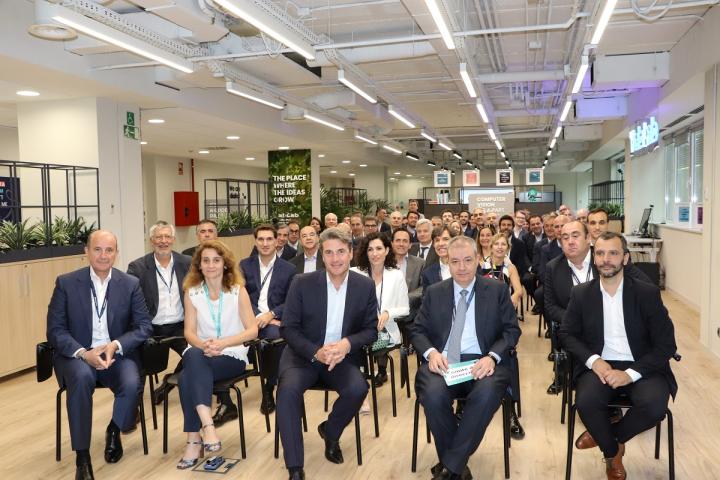The transformation of public administrations
The transformation of public administrations
The transformation of public administrations
Report on Public Administrations Work during the Covid-19 crisis
Creation date :
Deepening the Public Administration response to the situation posed by the health crisis and lines of work outlined in a 'post-COVID' future, the main objective of this panel discussion between Public Administration representatives and technology consulting firm experts is detailed in the Public Administrations Work during the Covid-19 crisis report.
Deepening the Public Administration response to the situation posed by the health crisis and the lines of work outlined in a 'post-COVID' future is the main objective of the panel discussion organized by the IECISA Public Sector Observatory between Public Administration representatives and technology consultancy firm experts, is detailed in the Public Administrations Work during the Covid-19 crisis report.
Ester Manzano, General Director of Digital Administration in the Department of Digital Policies and the Public Administration of the Generalitat de Catalunya participated in this panel discussion, held for the first time openly, online and with questions from the attendees; also in attendance were María Pérez Naranjo, General Director of Digital Transformation in the Ministry of Finance, Industry and Energy of the Junta de Andalucía; Óscar Robledo, Deputy Director General of ICT at the Ministry of Finance since 2009, and Sergio Rodríguez, Head of the Digital Public Employee Strategy at IECISA. The moderator was Víctor M. Izquierdo, president of IECISA's Public Sector Observatory, whose conclusions are included in the latest report published by OSPI.
The Public Administration response
The participants in the panel discussion - all of them with important roles in the Spanish administration - agreed that, since the beginning of the crisis, technological actions to protect the health of public employees were implemented alongside the continued provision of essential public services. Externally, electronic procedures were set up for citizens and telephone lines were<extended to the most affected areas, such as employment, health and social policies.
The rapid response from the Public Administrations and the efforts of professional teams to adapt quickly to the new situation played a key role. Society has undergone a significant cultural and organizational transformation where changes that might otherwise have taken years to implement were introduced within a matter of days. According to the experts assembled by OSPI, this scenario has also offered Public Administrations the opportunity to overhaul management models and at the same time offer better services to citizens demanding a new administration model
Telework, but regulated
A vision of the future was among the issues highlighted in this panel discussion. The introduction of teleworking, as stated by the heads of the different Public Administrations in attendance, is a great challenge for organizations: it requires more trust in people and involves a change in a work culture that should be well-regulated. The introduction of teleworking, as stated by the heads of the different Public Administrations in attendance, is a great challenge for organizations: it requires more trust in people and involves a change in a work culture that should be well-regulated. Evaluation and monitoring mechanisms to improve activity must be factored into the process.
According to the experts, the focus should be placed on trust in people, along with the need for regulation. Adequate regulations covering various aspects should be ordained and some fundamental factors for the success of teleworking should be highlighted:
•The definition of the personal conditions of each employee
•Goal-based regulation and project orientation.
•From a technological point of view, there is an existing need for user profiling and a rationalization exercise.
•Employee training and guidance.
Technology serving an organisational purpose
The cloud, artificial intelligence, process automation and collaborative work are emerging as the great technological trends to be advanced by the administration in the short term. In the section on cybersecurity, the speakers at this conference highlighted the need for "cyber-awareness" and employee training.
The new projects launched in response to COVID-19 have emphasised the need for pre-existing projects that “had not yet taken off”, because the main obstacle, a cultural one, has disappeared. Furthermore, its benefits have been proven with real use cases.
In the current situation, the Administration seeks to advance in the great technological lines of the cloud, artificial intelligence and automation, collaborative work and cybersecurity, to optimize processes and automate repetitive tasks that do not contribute value. However, the forum participants also agree that it is not only an issue of technology: the main factor of change will be driven by an advanced mentality in the people who must identify and adapt to the new day-to-day processes.
Download report (OSPI_El-trabajo-en-las-AAPP-during-COVID19.pdf)


